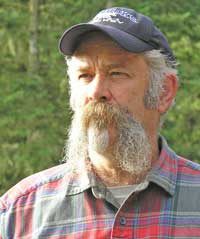By Steve Ulvi
Needing an Alaska fix, something more real than the absurd TV reality shows, I recently called an old friend, Archie, to chew the fat and trade barbs.
He thinks me a fool for moving south after decades of the good life in the “Big Cold North.”
I offered the guarded optimism I feel living here, as seven billion humans face the gaping maw of accelerated climate change. Here we have a geography of hope; mild climate trending warmer and drier, great growing conditions, a natural moat, fresh water and a strong sense of community.
The human masses who mostly live and die in quiet despair have never known the benefits of industrialization, nor contributed much to earth-warming emissions.
But we, in stark contrast, are among the most fortunate of all humans ever to walk the earth due to the gifts of geography, resource wealth, exceptional nutrition and unbridled capitalism. We live long and prosper with little concern for how we got here and the dirty legacy of rapacious industrialization.
Archie agreed in principle but scoffed while sucking in boiled black tea strong enough to etch glass. How helpful, he asked, will the well-healed in the islands be in the critical times ahead? You know they have a death-grip on their piles of money except to spend it on $4,500 toilets, huge SUVs, outlandish trophy homes and ungodly expensive yachts that seldom leave the dock?
I had to agree that our grey demographic here seems deeply divided in terms of awareness and empathy. The favorable social and economic conditions we have prospered under since WWII have solidified class distinctions and concentrated wealth and power in the top 10 percent.
Powerful self-interests always over-ride the common good, Archie growled. Common sense is really not so common.
With growing social dysfunction in mind, we agreed that the collective sacrifices of WWII seem inconceivable today. More sobering yet, that devastating war was a short, geographically limited political struggle compared to the tempest of suffering, resource disparity, displacement and conflict that is heating up, just over the horizon.
Welcome to the Anthropocene Era.
The effects of the not-so-invisible hand of the mythic “free market” and human manipulation are everywhere. Earth’s mantle of life is so very thin and incredibly complex.
Our atmosphere evolved over billions of years, fine-tuned by a proliferation of biological life all because the planet spins just so and orbits in the sweet-spot distance from a minor star.
Our 21st century human “success” is the direct result of 10,000 years of fairly consistent climatic conditions.
I was reminded of the repeated misuse of the adjective “pristine,” most recently by the Stewardship Network to describe our archipelago.
Really? Falsely equating visual landscape beauty with underlying ecological conditions, given irrefutable evidence to the contrary, as well as common sense, is foolish and intellectually lazy.
Magnificent resident orcas mesmerize us while steadily sliding down the slope of extinction. Yet, we seem only willing to rearrange the deck furniture some, rather than fix the root problems.
Archie, now on his high horse, snorted about the good folks who so willingly suspend reason to embrace religious stories on faith, but can’t for a moment consider accepting well-founded, but necessarily imperfect science, in understanding cause and effect.
Modern science cannot provide the “right answer” for complex social decisions. Only we can do that.
Although we are three decades behind the curve, we must own up to our causal role in accelerated climate change and fully embrace our responsibilities to do everything we can to lessen the magnitude and severity of cascading impacts beyond our time.
Greatly reducing our economic expectations, leaving fossil fuels in the ground, living lower on a local food chain and a willingness to pay the true cost of fossil fuels would be a helluva’ good place to start.
— Editor’s note: Steve Ulvi retired from the National Park Service in interior Alaska in 2006. He and his first wife, Lynette are settled in on San Juan Island with a homestead near completion.



